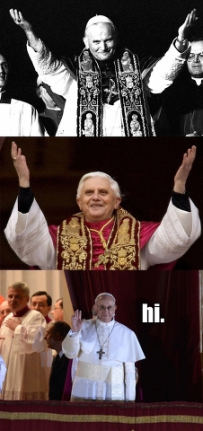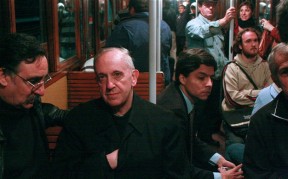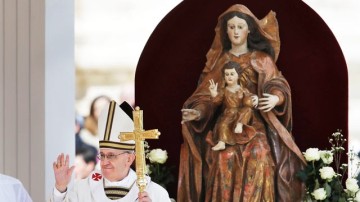 From the time Benedict’s successor was revealed, I believed that we were witnessing something different – hopefully change. Pope Francis I embraces many “firsts” – which is probably why the Cardinals chose him. Change and reconciliation seem to be at the forefront – something the Church so desperately needs today. Francis is the first Latin American Pope, first Jesuit Pope, first Pope to use the name of Francis after St. Francis of Assisi, a Saint held in high regard by Catholics. When I heard his chosen name, I immediately thought of St. Francis, to whom my favorite prayer is attributed. This is a prayer that inspires me and speaks about how I try to live my life – as one who strives for peace, and provides love, hope, and compassion. St. Francis’ story is a powerful story of conversion from a life of great wealth to one of voluntary poverty. Francis received a revelation from Christ to “rebuild my Church,” in a way that embraces peace and love as well as providing protection for all of creation. The notion of “Protector” was a major theme in Pope Francis’ homily during his inauguration mass.
From the time Benedict’s successor was revealed, I believed that we were witnessing something different – hopefully change. Pope Francis I embraces many “firsts” – which is probably why the Cardinals chose him. Change and reconciliation seem to be at the forefront – something the Church so desperately needs today. Francis is the first Latin American Pope, first Jesuit Pope, first Pope to use the name of Francis after St. Francis of Assisi, a Saint held in high regard by Catholics. When I heard his chosen name, I immediately thought of St. Francis, to whom my favorite prayer is attributed. This is a prayer that inspires me and speaks about how I try to live my life – as one who strives for peace, and provides love, hope, and compassion. St. Francis’ story is a powerful story of conversion from a life of great wealth to one of voluntary poverty. Francis received a revelation from Christ to “rebuild my Church,” in a way that embraces peace and love as well as providing protection for all of creation. The notion of “Protector” was a major theme in Pope Francis’ homily during his inauguration mass.
As an unlikely choice for Pope, mostly due to his age and health, Francis reminds me of another unlikely advocate for the people – a man chosen to be Archbishop because of his passivity and his ill-health – Oscar Romero. Romero surprised the people who placed him in office and stirred things up when he became a staunch advocate for the people that he served. Romero’s “moment of conversion” revealed something spectacular that changed Latin America. In his role as leader, he found his voice and became a defender for the poor and oppressed. It is because of Romero that I am hopeful that Francis will provide (or at least start the wheels in motion to provide) changes to the Catholic Church.
It should also be noted that another unlikely choice for Pope was Angelo Giuseppe Roncalli, the Archbishop of Milan, who was not even a Cardinal. Roncalli became known as John XXIII: a Pope who saw that the Church was in need of change and who took unprecedented action to convene the Second Vatican Council. Again, this story fuels my optimism.
I, like most Catholics, was (pleasantly) surprised when I saw the new Pope appear. In stark contrast to his two predecessors, Francis emerged in a simple white cassock, and his face that seemed to reflect humility and kindness.  Then another surprise came; before he extended the traditional Papal blessing on the crowd, he asked the people to bless him and bowed his head toward the people. A glimmer of hope sparked. Could this be the person to bring about change that so many of us pray for? Is this the person that will reconcile and rebuild my Church? I hope so.
Then another surprise came; before he extended the traditional Papal blessing on the crowd, he asked the people to bless him and bowed his head toward the people. A glimmer of hope sparked. Could this be the person to bring about change that so many of us pray for? Is this the person that will reconcile and rebuild my Church? I hope so.
I am not, however, forgetting his conservative postitions on “progressive” issues, especially gay marriage and ordination of women. He was, after all, appointed by Pope John Paul II and certainly holds similar views on these issues. He fought the Argentinian Government on the issues of gay marriage, same-sex couple adoptions, and free distribution of contraception. His role in the “Dirty War” is also a point of controversy, as is his criticism against liberation theology – a criticism that seems to be rooted in the role liberation theology plays in politics, not because of its concern for the poor. Focus on the poor seems to be at the core of Francis’ being. However, for him the word “poor” means “impoverished.” Does his stance embrace others who are oppressed and marginalized including women of the Church?
Leonardo Boff, a Jesuit who was silenced by Pope John Paul II, has come out in support of Pope Francis. Because of my respect of Boff and his writings, I view this endorsement as another reason for hope. It should be remembered that the relationship between the Jesuits and the Vatican was strained under Pope John Paul II’s papacy. Many diocesan priests (and other Catholics) do not readily accept Jesuits as being “Catholic.” Jesuits do things a bit differently.
Jesuits take four vows: poverty, chastity, and obedience, including the fourth vow that calls for specific obedience to the Pope. The focus is on service and scholarship. Francis’ appearance is one of simplicity – black shoes and a simple white cassock. He steered clear of the “benefits” that many Cardinals enjoy and opted instead for a simple apartment, public transportation,  economy flights where he carried his own luggage, and prefered the simple black robes of a priest to the more elegant attire that Cardinals are entitled to wear.
economy flights where he carried his own luggage, and prefered the simple black robes of a priest to the more elegant attire that Cardinals are entitled to wear.
Jesuits are used to working collaboratively. Francis seems to placing himself, not above the Cardinals, but on the same level. He referred to himself as the “Bishop of Rome” giving an indication that he views himself as first among equals. Moreover, Jesuits are considered servants, not authorities in the Church. They do not seek positions of authority, but accept it when these positions find them.
Jesuits are known for education and “free-thinking.” As Cardinal, Francis defended theologians that he personally disagreed with because he believes in open discussion – even on the issue of celibacy of the clergy.
Jesuits encourage toleration for other religions. They teach other than Roman Catholic theologies at their educational institutions. As Cardinal, Francis was seen as a “great conciliator in Argentina” and even expressed “his admiration for the atheist socialists who help bring social justice to Argentina.” After his election, he met with the Ecumenical Patriarch of Constantinople, Bartholomew I, as well as the Metropolitan Hilarion of the Patriarchate of Moscow. For the first time since the Great Schism in 1054, the Patriarch sat in a place of honor near the papal altar.
The question remains, do I think major changes are coming? Yes, but through reconciliation and dialogue. Maybe Francis will encourage a transformation in the Catholic Church from its rigid structures, rules, and hard-line stances and reform it as a “missionary” Church – the kind of Church that was promulgated by the Jesuit missionaries in America.
I also find hope in the fact that Francis believes that the church must move with the times and be in constant transformation. In stark contrast to those who call for the Church to adhere to “tradition,” he understands that tradition within the Church is changing and emergent:
If, throughout history, the church has changed so much I do not see why we should not adapt it to the culture of [our] time.
I also believe that changes in the structures of the Church are coming – something Francis began in Buenos Aires. The first thing Francis did after his election was to visit to the altar tomb of Pius V who was a major force in reforming the Church in the 16th Century. Pius cleaned up the Curia, excommunicated heretical bishops, and paved the way for the counter-reformation that restored peace to the Church. Could this become the cornerstone of Francis’ Papacy?
As Cardinal, Francis has a track record of doing things differently. He commissioned divorcees to roles of ministry, developed outreach programs, provided support to former prostitutes and drug addicts, and criticized priests of “clericizing” the Church.
This Church of come inside so we can make decisions and announcements between ourselves and those who don’t come in, don’t belong is hypocritical. Those who clericize the Church. Those who separate the people of God from salvation is akin to what the Pharisees did in Christ’s time;“congratulat(ing) themselves while condemning all others.
The Church for Francis is not a political entity or a compassionate NGO, but a “dramatically spiritual human institution and learns its true nature with its virtues and sins.” The Church should be focused on the Gospel: walking in the presence of the Lord.
There are sectors within the religions that are so prescriptive that they forget the human side.
For Francis, social outreach is the essential business of the Church and is more important that doctrinal battles.
Finally, he is extremely critical of those who covered up pedophilia:
If a priest is a pedophile, he is so before he becomes a priest [not because he is celibate]. But when this happens you must never look away. You cannot be in a position of power and use it to destroy the life of another person.
He also stated that the solution proposed by the U.S. “of switching [pedophiles] to other parishes … is stupid, because the priest continues to carry the problem in his backpack.” The only answer to the problem for Francis is zero tolerance.
Francis’ Jesuit background, his vision of the Church to be one of outreach, service, and mission, his stance on the Church as moving with the times, his no tolerance stance on pedophilia, and his openness to dialogue, even on issues he disagrees with, is, at the very least, a decent start.
Admittedly, we have a long road ahead, but I am cautiously optimistic that road might be in sight. Only time will tell if we will move together down the path that Jesus walked or if Church leadership will stay on the path of hierarchical male power.
Michele Stopera Freyhauf is currently a Doctoral Student in the Department of Theology and Religionat Durham University. She has a Master of Arts Degree from John Carroll University in Theology and Religious Studies, is a Member of Sigma Nu, performed post-graduate work in History focusing on Gender, Religion, and Sexuality at the University of Akron, and is an Adjunct Instructor in the Religious Studies Department at Ursuline College. Her full bio is on the main contributor’s page or at http://durham.academia.edu/MSFreyhauf. Michele can be followed on twitter at @msfreyhauf.




Michelle, thanks for pointing out these reasons for hope. I profoundly hope you are right. The one thing we can say for sure is that nobody knows the future, nobody knows what can happen.
Would you say a bit more about why you view the Jesuit mission to the Americas in a positive light? I am more familiar with stories of forced conversion and cruelty, despite “intentions” which may have come from good though misguided hearts. Do you think it was good for Jesuits to come to the Americas to convert the Indians? Do you think other peoples of the world “need” to be converted Roman Catholicism today? If not, what is the meaning of a missionary church? To feed the poor or to fight injustice does not require a mission of conversion, or should it?
LikeLike
My intention was to convey a movement from forced doctrinal compliance to a church of service that helps people, following the example of Jesus’ earthly ministry, promoting the social gospel – definitely not forcing conversions.
In the ecumenical spirit, I don’t believe there is a right or wrong religion – but rather we need to be respectful of each others faith beliefs. Hopefully I did not convey a need to convert all to Catholicism today.
LikeLike
I can agree with that while not necessarily sharing your enthusiasm for Jesuits. I was a practicing though not baptized but inherited through family connections Catholic for 5 years following Vatican 2. I too hope for reform of the church, along the lines promulgated by Vatican 2.
LikeLike
Michelle, I am not a Catholic and I continued to be puzzled as to how and why the Catholic Church can ignore the following biblical texts. Women participated in religious rituals. Hannah went before the altar to pray. (1Sam. 1:9). Samuel spoke to feminine prophetesses (1:Sam. 19:20) and Isaiah spoke of “going to a prophetess. (Isa. 8:3) Huldah was a prophetess. (2 Kings 22:14) Women are included along with men in a passage about serving/ministering in religious services (Isaiah 56:6 LXX) and giving offerings on the alter. (Isaiah 56:7 LXX) Yet this is not commonly known because the text, although it is in the Greek Septuagint (LXX), is absent from the more recent Hebrew text and many English translations. There is a feminine preacher in Ecclesiastes 7:28-30 LXX. Daughters “prophesy” in Joel 3:1-2 MT. Women, like Anna, were priestesses in New Testament times. (Luke 2:37). Tabitha of Dorcas was a disciple (Acts 9:35), Junia was called an apostle (Rom. 16:7); Phoebe was a “minister” (Rom. 16:1-2) and Martha “ministered” at a cult meal. (John 12:2). Finally, Mary of Bethany performed a sacramental act when she anointed Jesus for his burial (at the Supper in Bethany, John 11:27) And Jesus said her memory should always be kept. So, what is the problem with the current male hierarchy?
LikeLike
I hope your hopefulness bears fruit, but I’m still very suspicious of those old men in skirts. (Why don’t they start wearing pants in public?) I remember Vatican II and the hope it stirred up. Do you think there might be a Vatican III?
LikeLike
It is my strong belief that RCWP and the Catholic faithful should break with Rome, creating our own Catholic Church at least here in America. When the Bishop excommunicated me and the other members of our little faith group, he said that the excommunication was for medicinal reasons only and that we remained Catholic; therefore, I am a Catholic shunned by the hierarchy of my faith institution but not by the people of the faith. After sixty-four years of being a faithful and devout Roman Catholic, I am now a faithful and devout RCWP Catholic. There is an opportunity here to fulfill the promises of Vatican II if we split with Rome. There is opportunity here to further God’s plan and spread his message in its purest form without discrimination and rejection of any of God’s people if we split with Rome.
It took five hundred years for the hierarchy to exonerate Galileo. Do we think the equality of women within the Roman Catholic Church will happen any time soon? Frankly, by the time female priesthood is accepted, we will be two different churches anyway, unwilling to compromise our own beliefs for acceptance. We must form our own independent Catholic Church, offering inclusion and fellowship for all. We must push for the completion of Vatican II and reject the nonbiblical attitude of the hierarchy.
LikeLike
Feminism is as much a way of life, a paradigm for compassion, a profound path of wisdom as is Zen, for instance, so why not embrace it in the same way as a religious path, this journey we call WomanSpirit Rising.
LikeLike
The Catholic Church has split and I encourage all to go to the American National Catholic Church web site. http://americannationalcatholicchurch.org
They trace linage through Roman Catholic Bishop Carlos Duarte-Costa of Brazil. When you go to their web site check out the FAQ. Your spirit will be lifted and you will see that the Church we prayed for already is established.
Women priests, married priests, ALL are welcome, etc.
LikeLike
Thanks for the excellent commentary. One slight error, Cardinal Roncalli was made a Cardinal by Pius XII in 1953 and went on as Cardinal Archbishop of Milan, then elected Bishop of Rome in 1958.
LikeLike